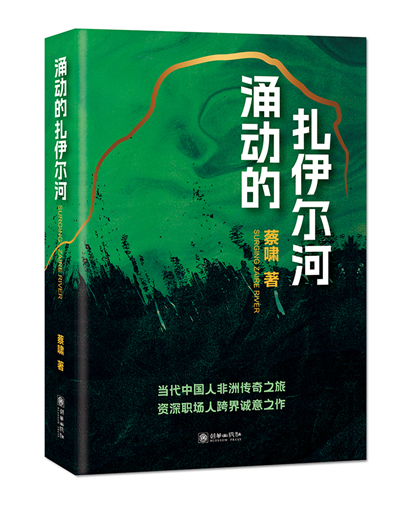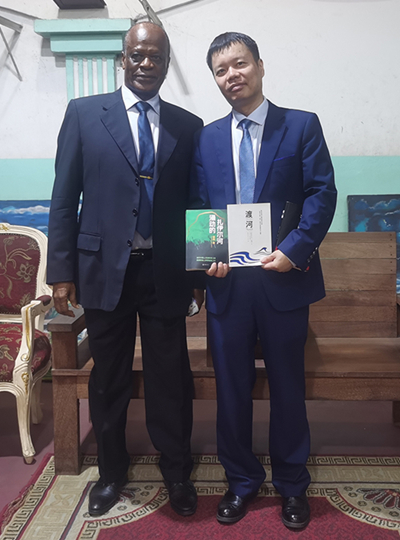|
||||||||||
| Home Nation World Business Opinion Lifestyle ChinAfrica Multimedia Columnists Documents Special Reports |
|
||||||||||
| Home Nation World Business Opinion Lifestyle ChinAfrica Multimedia Columnists Documents Special Reports |
| ChinAfrica |
| Tales From a Distant Land |
| New novel depicts lives of Chinese living in Africa |
| By Hu Fan 丨VOL. 15 March 2023 ·2023-03-02 |

Cover of the book Surging Zaire River
Cai Xiao was excited to know that after four years of hard work, his novel was about to be published. Titled Surging Zaire River, the novel depicts the lives of Chinese based in Africa and active in various sectors on the continent. As a Chinese fiction work based on an African setting, the novel is essentially one of its kind.
The novel is set in an imaginary country in the Zaire River basin and tells the story of how a Chinese telecommunications company overcomes various challenges to promote local digital development. Among the main Chinese characters are entrepreneurs, company employees, and media workers.
Cai said these characters are based on the Chinese in Africa he met. “I was impressed by their ability to cope with the difficulties they encountered in a continent far from home and admired their perseverance and courage,” he told ChinAfrica.
Being published on the occasion of the 10th anniversary of the launch of the Belt and Road Initiative (BRI), which has seen more Chinese people going to work in Africa and other parts of the world, the book is also a tribute to these groups of people.
Filling a gap
Having spent most of his career in the human resources sector, Cai never considered himself as a professional writer. His most intensive experience with fiction writing dates back to six years ago, when he wrote an autobiographical novel about the campus life.
However, his experience working in the human resources departments of multiple international companies gave him the chance to know many Chinese working in other countries including African countries. He found many of them had valuable experience working and living in Africa, but few of them had the skill or time to share their stories with a bigger audience. He thought it would be a good idea to present their collective experience in the form of a novel.
“It is believed that with the progress of the BRI, there are more than 1 million Chinese in Africa working as diplomats, journalists, company employees, business owners and so on, so it is really important for someone to tell the stories of these people during this period,” he said.
Cai also hopes that the novel will fill a gap in Chinese literature featuring Africa. The recent years have seen increased African elements in Chinese people’s cultural life, such as the 2017 blockbuster action movie Wolf Warrior II, 2018 military movie Operation Red Sea, and the more recent movie Home Coming about Chinese diplomats, which are all set in Africa. However, literary works about Africa in general are rare in China.
Cai attributed this void to a lack of attention from China’s literary circle to African topics and their limited exposure to African affairs. Though he is not a full-time writer, he believes his work experience puts him in a unique position to write fiction related to people of different occupations in an African setting. “Professional writers may be good at writing, but it will be difficult for them to provide credible details if they are not immersed long enough in a workplace environment,” he said.

Cai (right) poses for a photo with Henri Djombo during a cultural exchange event in Brazzaville, capital of the Republic of the Congo, on 6 December 2022
Rediscovering Africa
The novel is set in a fictional country in the Zaire River basin, so Cai had to know enough details about the region, ranging from geography and climate to culture and social structure, to make his stories credible. In addition to what he learnt from his colleagues, Cai also consulted many studies as well as films and TV shows about African countries and China-Africa relations. The Internet, especially short video platforms, helped him greatly in forming intuitive impressions of the current lives of Chinese in Africa.
To verify the knowledge he gained about Africa and find more content for the book, he embarked on a trip to Africa in late 2022. During the one-month trip, he visited various locations and met with locals and Chinese in Zambia and the Republic of the Congo. He talked to local officials and members of the literary circle and learned about the life of ordinary Africans and their interactions with Chinese in markets and mines.
What struck him most was the almost ubiquitous presence of Chinese infrastructure and Chinese people in these countries. The railways, roads, water facilities and telecom base stations left great impressions on him. While driving on the No. 1 National Highway of the Republic of the Congo, the main artery linking Pointe-Noire, the country’s economic centre and second-largest city on the Atlantic coast, and Brazzaville, the capital, he experienced the admirable feat of the Chinese in building a highway in the middle of primeval forest.
In addition, the trip helped him to find the answer to a question he had harboured for a long time: Why are some African countries lagging economically despite their abundant resources? He believed it was because they had interruptions during their development and entered the industrial age abruptly, so they needed to accumulate experience regarding national governance and economic development.
“Therefore, African countries can benefit from countries with such experience, like China, whose achievements over the past few decades, including management and technology, can be useful to African countries. This is the fundamental reason why the BRI can be of great value to the continent,” he said.
Another thing that impressed him during the visit was that many Africans, like the Chinese, were making efforts to change their lives and that of their next generation. There are people who are trying their best to get into university or study in China, while others are working hard to gain job skills or even working overtime to earn more money to make a better life for themselves and their families and to save for their children’s education. “I would like to say that it is ordinary people like these who will make Africa’s future brighter,” he said, adding that he has included such locals in his novel.
The trip also took him to Chinese business associations, Confucius Institutes, the Shaolin Temple in Zambia and other organisations and facilities promoting exchanges between the Chinese and African people. He also attended a cultural exchange event held by a writers’ association of the Republic of the Congo, where he met with like-minded author Henri Djombo, who is a former minister of agriculture, livestock and fisheries of the country and has had two novels translated into Chinese and published in China.
In Cai’s opinion, people-to-people exchanges are essential to the healthy development of China-Africa relations in the long run. Though great progress has been made, people-to-people exchanges between China and Africa are not as intensive as diplomatic and economic contacts. He calls for every individual to take part in promoting China-Africa friendship. “You can always find a way to take part as long as you want to,” he said.
| About Us | Contact Us | Advertise with Us | Subscribe |
| Copyright Beijing Review All rights reserved 京ICP备08005356号-5 京公网安备110102005860号 |